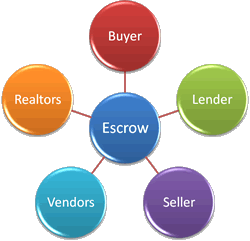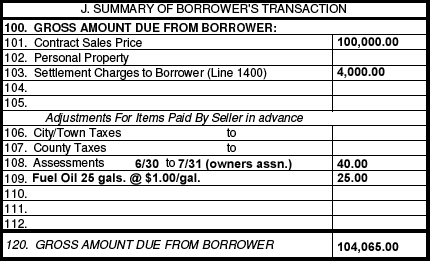
What Exactly Is Escrow?
You’ve more than likely heard the word “Escrow” thrown around when it comes to real estate. But do you know what it REALLY is? Is it, a person? An account? A process? Do I really even need to know?! Escrow is all of these things and more. It’s the mighty superglue that holds transactions together and keeps them on schedule. But more importantly it’s where hundreds of thousands of dollars of your hard earned money is being kept when you buy or sell property. So does it matter who holds onto your money? Do you trust just anyone with your life savings? Protect yourself and understand the process – It’s Escrows 101.
Escrow Officer
By Definition, an Escrow Officer is a neutral third party whose job is to gather all the documents and information from all involved parties to prepare the transfer of property. First, this means an Escrow Officer cannot take sides. They cannot favor the seller over the buyer, or vice versa. As an example, they can answer every question you may have about what certain paperwork means, or how the time line is proceeding, etc., but they cannot give you any advice about what you should do if the answer could affect the other party to the escrow. That is your agent’s job.
 Think of your officer as the hub of a wheel…a wheel connected by those pneumatic tubes like they have at a drive thru bank. There are lots of tubes in this “escrow wheel”…an escrow instruction tube, a title tube, termite tube, home inspection tube, loan process tube, home warranty tube, perhaps a roof or septic certification tube, a tube for paying off bills that pop up (alimony, child care, tax liens, credit cards, court judgements, etc.), a tube for amendments, documents, deeds of trust, and many more depending on the escrow. Bottom line here is you get the point….lots of tubes all pointing at your officer.
Think of your officer as the hub of a wheel…a wheel connected by those pneumatic tubes like they have at a drive thru bank. There are lots of tubes in this “escrow wheel”…an escrow instruction tube, a title tube, termite tube, home inspection tube, loan process tube, home warranty tube, perhaps a roof or septic certification tube, a tube for paying off bills that pop up (alimony, child care, tax liens, credit cards, court judgements, etc.), a tube for amendments, documents, deeds of trust, and many more depending on the escrow. Bottom line here is you get the point….lots of tubes all pointing at your officer.
Unless you have a personal friend or family member who happens to be an escrow officer, chances are you wouldn’t know where to find one. Most of the time, your agent will suggest an escrow company/officer who has proven to be reputable, timely and accurate.
Escrow Account
On paper, most of these “tubes” are associated with a cost to the buyer or the seller. Most fees associated with a real estate sale flow through an Escrow Account. Think about it like a neutral bank account between the buyer and seller where funds are added, removed, or paid to the appropriate people at the right time.
To keep track of all the comings and goings of funds, Escrow Officers prepare a balance sheet known as a settlement statement. This provides a to-the-penny breakdown of the entire transactions fees, loans, and expenditures in order to “balance” the account at closing. When escrow is first opened, a buyer deposits funds to the account (called Earnest Deposit). If the purchase price was $250,000, and the Earnest deposit was $5,000, then the escrow account now shows that the buyer needs to fund an additional $245,000 at closing.
On the opposite of the statement, it might say the seller is owed $250,000, but has to pay off a $100,000 mortgage first, meaning they will be paid the difference of $150,000 at closing in order to balance the account. Of course this is an oversimplified example, as there are usually dozens of line items for both buyers and sellers.
Example of Settlement sheet.
Escrow Account 2
Yes, even Escrow Account can have multiple meanings! Once a property is closed it is said to have “Closed Escrow”. The title transfer is complete, loans are funded, and proceeds are dispersed. But where one door closes, another one opens. Assuming you have a loan on your property, you will have an ongoing Escrow Account. This account is used to set aside part of your monthly payment to pay fees on your behalf, such as taxes and insurance.
While you make one payment to the bank on your mortgage, you are actually paying towards quite a few different things. You see, the bank wants to collect your property taxes on your behalf and pay them for you. Why? Because if you forget to pay them, a tax lein can be placed against your property which has a higher ranking than your original loan – therefore the bank could lose out in its money they lent to you if you face tax foreclosure. Rather than risk that, the bank puts a little money every month in an escrow account and pays your tax bill for you, how nice of them! An Escrow Account can sometimes also be referred to as an Impound Account.
A note on “Title”
Title companies and Escrow companies are technically two separate things, however you will hear them used interchangeably. An Escrow company handles what’s been described above whereas a title company issues title insurance which gives the buyer peace of mind they own the property and no one else can stake claim to it. That being said, more of often than not, most escrow companies also provide title insurance, so they become virtually one in the same. You are not required to use the title insurance at your escrow company, although it simplifies the process and most buyers would have no reason to go outside of the escrow company to find this specialty insurance.


Comments are closed.